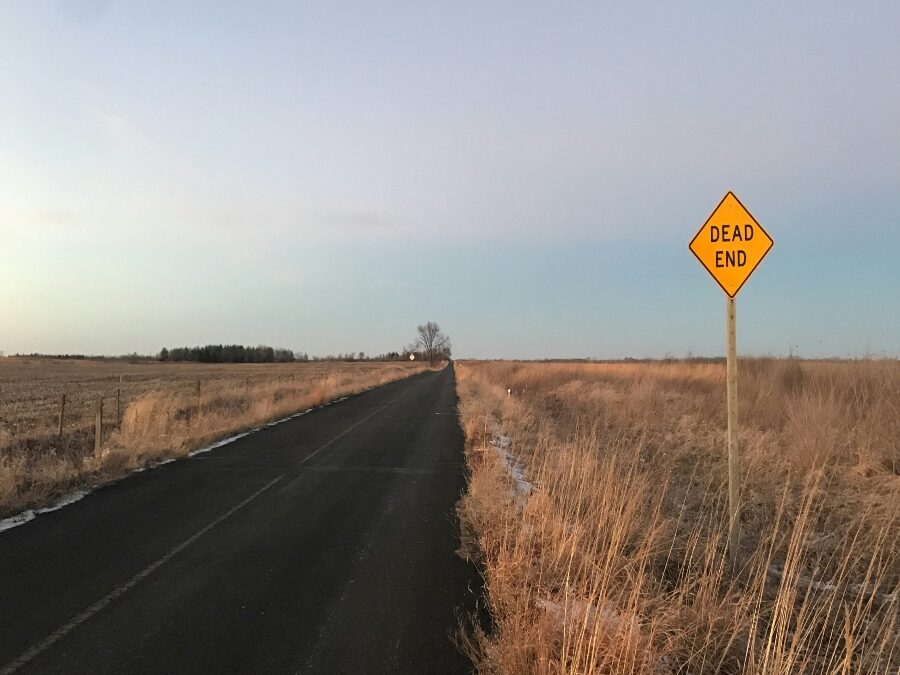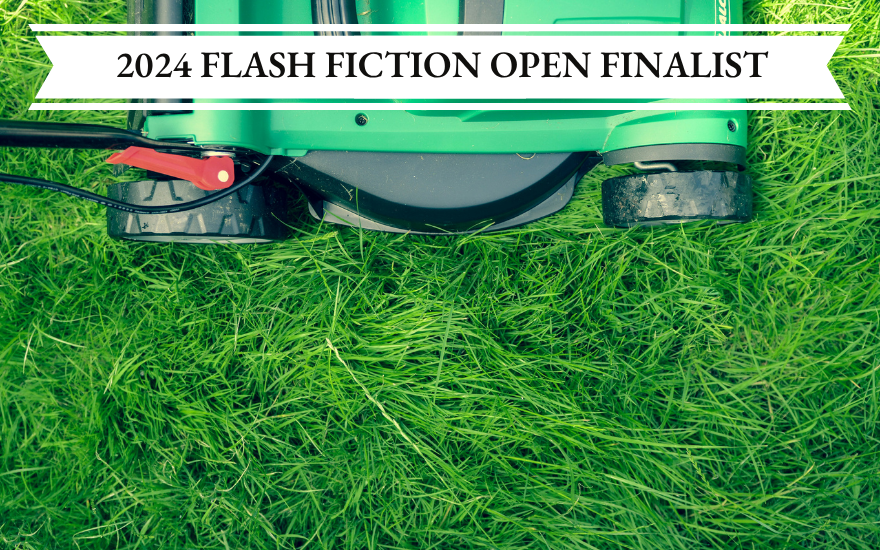
by Lori Sambol Brody | Mar 20, 2025 | micro
During the day I paint numbers on watch dials so they shine luminescent, but when the factory bell rings, I paint myself for you. My teeth, my eyelids, my nails. The circle of my drugstore compact reflects the glowing pieces of me, the mirror a door I could slip through if I were just bright enough. I wield the same brush I use on the watch dials, so soldiers can tell time in dark trenches, dipping it into the Undarkpaint. In the Radium Factory’s bathroom, I unbutton my smock, unlace my corset, paint my skin. Starbursts on my stomach, arabesques down my shoulders, spirals on my areolas. Your skin’s sensitive there, you say, your tongue on my nipple, licking off the paint, so I don’t glow anymore; I’m just like the other girlfriends you’ve brought to your rented room. The girl from the milliner, the girl from the laundry. I come to you like those sea creatures I saw once on the shore at night, bioluminescence limning each wave. I bare my shining teeth, how I growl for you. My body moves against yours until the Undark fades away, absorbed into you. The girls at the Radium Factory whisper to me, Watch out for him, he’ll throw you out soon enough. At our workstations, we suck on the brushes’ camel hair tips, to give them sharp points. Our gums bleed, our teeth loosen. That night when you slipped rings on my fingers, stacking them so my hands were armored with shining gold and crimson embers and hot flashing white, I didn’t ask you the names of the women who wore the rings before me, didn’t ask if the gems were glass, didn’t resist when you took the rings back. I just let them slip from my fingers into your palms. The sound of my teeth falling into your cupped hands, my bones shattering under your touch. My brothers threaten to jump you in a dark alley, tell me rumors. But every night I paint myself into being for you, and every night you unmake me.
*originally published in Synaesthesia Magazine

by Caleb Ludwick | Mar 17, 2025 | contest winner, flash fiction
She wakes to a white-bellied blur, a frantic smudge of a bird looping the motel room. It jerks sideways like something hunting or hunted, bounces off the window and scrabbles at the mirror. Its wings pop so loudly, the sound ricocheting off the pressboard walls, that at first she thinks there are dozens of them. Hundreds.
“Get the window.”
Her voice is wet with sleep. She elbows Coby lightly and he sits up. “Open it, let it out.”
But he is already out of bed, chasing the bird around the room in nothing but his socks. He is thinner than ever, his legs sticks, his stomach a wrung sponge. Light from the cracked window pools at his hip bones and dances along his swinging arms, down his back. She pulls the blanket over her head, but he grabs the corner and tugs until she tumbles off the bed. She is thinner too, her breasts nearly only the dark nipples, tight in the cold morning air. Her eyes dark circles that spread out and across her nose, brown going yellow at the edges. But her hips are still wide, thighs strong as levers.
She stands, pulling another corner tight and holding it over her head. Their arms swing in sync, both laughing now.
“Higher,” she says, and they come around the bird, keeping it between the blanket and the window. It flies in a cramped circle, tighter and tighter as they shuffle forward, glancing off the window pane with every pass until it dives straight into the blanket, trying to pierce the thin cotton with its beak. Areli gropes behind her with one hand until she finds the doorknob, twists, and the door jumps open. She nods at Coby, and they shake the blanket until the bird zigzags out.
They stand laughing in the open doorway, naked, sweating, starting to shiver, trying to watch the bird fly away but losing it against the clouds. In front of them, the parking lot is scattered with old cars and RVs angled haphazardly between the evenly-spaced, perfectly parallel white lines. A tall patch of ragweed and a chain link fence, then the mumbling highway stretching from dark to dark, punctuated with bubbles of grainy yellow streetlight. A caravan of early morning delivery trucks rumbles past, downshifting up the hill to the black silhouette of the horizon.
Areli’s laugh fades first.
“I don’t like sleeping all night,” she says.
“Sometimes we couldn’t even sleep through the night. She’d wake us up every hour. Remember?”
“Don’t use that word, not about her. I don’t want to. I don’t want to have to.”
Coby wraps her in himself, in the blanket. The doorknob is cold in his palm.
He waits for her to tell him what to say, what to do.
Closes the door.
Walks her back to bed.
Curls against her in the quiet.
Watches sleep hover overhead, just out of reach, suspended by strings from the ceiling.

by Desiree Cooper | Mar 14, 2025 | flash fiction
The guide led the small group of tourists through the grand foyer of the Powell Hall plantation house. Madison shambled far behind the others, eight months pregnant and exhausted by the Georgia heat.
As she and Justin stood in the parlor listening to the docent yammer about the Powell family fortunes, the floodwaters of anxiety rose. In her last trimester, her senses had gone feral: she could sense the cruelty that still permeated the big house. It was in the brocade drapes that kept the interior shrouded in darkness. It was woven into the lace doilies crocheted by gnarled Black hands. It was in the pewter punchbowl gleaming from the sideboard, waiting for the South to rise again.
Her knees buckled. She needed air.
“You OK?” Justin asked, pulling her close.
“I’m fine,” Madison said. “I just need to step out a minute.”
The couple had planned this trip more than a year ago, after the second miscarriage, after Madison’s struggle with depression. Her mother and grandmother now long gone, Madison consoled herself with documenting the family stories that they’d passed down—and unearthing the stories they hadn’t. Genealogy became her obsession. If she was never going to be the conduit of her family’s mitochondria, she thought sadly, at least she could be the vessel of its history.
After several months of research, she had made good headway: DNA tests, online research, connections to cousins she never knew she had. But the road to the past hit a dead end in Georgia’s Sea Islands. She had talked Justin into a road trip from their home in Philly down the Atlantic Coast. They could sight see, gorge on seafood, and snooze on beaches. Once in Georgia, Justin could golf while Madison scoured area plantations, rummaged through courthouse records, wandered among tombstones in old churchyards. Her excitement about the trip began to replace the emptiness of infertility. With time, Madison was able to gaze in the mirror, see her grandmother’s gray eyes, and not buckle with grief.
But there came a day when she saw something new in the contours of her face.
“Look!” she’d said one morning, pouncing on the bed where Justin was still asleep. In her hands, she held a pregnancy test.
Justin had opened his sleepy eyes and gazed dreamily. Then the alarm: “Is that a Covid test?”
“I’m pregnant, sleepyhead,” she laughed.
He yelped with relief, then pulled her into a bear hug, planting kisses everywhere. They’d lounged in bed that morning, missing work, trying to figure out when the miracle had happened.
Suddenly, Justin grew somber. “We’re not going to Georgia this summer, then,” he’d said. “We’re not taking any risks.”
But already, the new life had cemented her connection to the past.
“We’re going,” she said firmly. “I have to do this now more than ever.”
Madison fled to the portico and down the front steps of Powell Hall. Heaving, she slumped against a 200-year-old live oak. But even in outside, she couldn’t escape the gravity of the plantation house and its proud horrors.
Escaping past the garden, she found herself among a row of small, brick cabins—the homes of the Igbo people who had been kidnapped, enslaved, and forced to toil in the suffocating heat sowing and harvesting rice. She approached one of the cabins and gingerly peered inside. It was a single room, half the size of her high rise living room back home. A packed dirt floor, a crumbling hearth. Sharp anguish pierced the air. Madison protectively cradled her taut stomach.
The sweetgrass weaver in town had told her the story. How a handful of enslaved Igbo had tried to escape through the surrounding marshes. Beneath a new moon, they could not find their way out. When the choice was between the baying hounds or water snakes, some had decided to clutch their children tightly and drag them down into the depths. At least in death, their spirits would be able to fly home.
A slight breeze moaned. Grief floated on the sunlight like dust. Madison’s blood pounded hot, her head a cyclone of voices, her skin prickling cold. Her body shriveled against a crowding presence. The room was too small; not enough space for her, her unborn child, and the ghosts who still lived there.
The fetus began to scutter. Lunging for the cabin door, Madison spilled onto the ground. Screams clotted her throat. There she writhed in the windless sun, the child laboring to get free, the mother lolling in the grass, drowning.
The labor had been sudden, three weeks early, and unusually fast for a first child. The baby arrived thin and lethargic, skin tinged indigo.
It wasn’t until the baby was allowed to leave the hospital that Madison and Justin dared to give her a name. They had picked out “Bella” after Madison’s mother, Isabel. But when Madison held the child who had narrowly missed being born on a Georgia plantation, she insisted on “Kambili,” Igbo for “Let me live.”
They brought Kambie home to Philadelphia and nestled her into the nursery of seafoam and sunshine. Madison went through those first hours in a haze of shock and gratitude: she was finally a mother.
But the longed-for child was five pounds of rage. For days on end, Madison offered the newborn her engorged breast, her pinky finger, a bottle. But the tiny thing would lock her jaws and throw her head from side to side, refusing succor.
“She’ll eat when she’s hungry,” the lactation coach promised. “The best thing you can do is keep calm. This is a tough period for a lot of new moms.”
Madison couldn’t stop sobbing. She should have been flooded with oxytocin, the hormone of motherly bliss. And she should have been feeling complete, now that she and Justin were finally parents. But the magic of it all was swept away by the baby’s cruel rejection.
“I can’t understand what I did to her,” Madison wept as Justin tried to comfort both mother and child.
“You kicked her out of her snug, little womb,” he said, kissing the top of his wife’s head. “It’s going to take some time for Kambie to recover from being evicted.”
Madison tried to believe that the baby was just sensitive or colicky. But something was wrong. Night after night, the frail infant would startle awake, her arms thrown open wide, her body wired with terror. When Madison tried to soothe her, Kambie howled as if she were bruising beneath her mother’s touch. When Madison tried to calm her with a warm bath, the baby flailed as if fighting for her life.
For two sleepless weeks, mother and daughter struggled. Kambie only quieted with her father, or sometimes beneath the hug of a weighted blanket. Madison couldn’t find her footing, her eyes ringed dark with doubt, her hair as brittle as her patience. The pediatrician begged her to relax, assuring her that every birth—even miraculous ones—had its challenges.
But Madison was consumed with anger and shame; what kind of mother couldn’t satisfy the basic needs of her baby? What kind of newborn hated her own mother?
When Justin hinted that he needed to make an appearance at an evening work function, Madison offered a brave smile.
“Go, we’ll be fine,” she said, hoping that Kambie, now six weeks old, would sleep the whole time he was away.
As soon as he left, Madison heard Kambie on the monitor, squirming. At the first whimper, she rushed to the nursery. Gently lifting the baby, Madison pressed Kambie to her breast, trying to foreclose the inevitable storm. But the whimper hurricaned into shrieks. Madison paced the room, bouncing the child in her arms. She cradled her in the rocking chair, terrified that Kambie would stop breathing if she didn’t calm down.
Please, Madison whispered. Please, help me.
This she prayed to her long-dead mother, or maybe it was to her grandmother. Or maybe it was to her great-great-grandmother, the enslaved woman who had stood in the cabin doorway smothering the cries of the infant in her arms, trying to decide where the child would suffer the least—on the blood-soaked plantation soil, or beneath the liberating waters of the dark swamp.
From the closed window wafted the scent of magnolias. The sea lapped the stiles of the rocking chair. Hounds bayed in the city darkness. Madison clutched her baby tighter, as the child’s eyes mooned in fear. Up from the murky water, the spirits had come to take Kambili home.
“No!” Madison wept angrily. “We’re not going under.”
The humid sadness whisked out of the room. The baby exhaled deeply, then her body relaxed. Gingerly, Madison put the child to her breast. Now calm, Kambie bobbed her head and nursed.
“It’s OK, little one, you’re safe here with me,” Madison whispered. “Remember, we are the ones who lived.”

by Candace Leigh Coulombe | Mar 13, 2025 | contest winner, flash fiction
Do not let your children stand in the shopping cart. Do not let them ride in the bottom of the cart, where pigtails or small hands could get trapped in the filthy wheels. And never — never — leave them unattended in the store.
You will linger while looking for the price of party-size packs of gummy bears or thumbing through a book on string theory, and then she will be gone. She was just right here, you’ll say, or just one aisle over. It will feel like less than 30 terrestrial seconds have passed. You’ll call her name, check around corners, look for a helpful employee in a hyper-spectral blue vest. But soon, your hopes will be crushed by the vastness of the shopping megaverse.
To hold all that you could ever want, OmegaMart extends from the outskirts of the suburbs to the edge of the exoplanet sphere. Good luck remembering where you parked. You will be exhausted just by walking from the garden center to the plane that contains comfy flip-flops and replacement cyborg feet. You will need to stop for a bright blue slushie and soft pretzel.
The thing is, OmegaMart has everything. All the things you need. The things that you don’t need but your neighbors have so you think you do. The things that you’ll break and the things to replace them. The things that you’ll lose and the things that will make you forget about them. All of your hopes and dreams and regrets and untapped potential – all at very low prices.
You will not forget your child, but at some point you will concede that she will not be found. At least not by you. And perhaps she will have even toddled into the aisle with the isekai boxes and have been transported to a realm more happy and enchanting than your own.
Actually, you will momentarily forget and fill your cart with economy-value boxes of training pants and applesauce pouches, and then have to put it all back.
You will cross things off your shopping list. You will try to concatenate the logic of the store layout. Will the biological things on your list be near the produce aisles? Why is it so hard to find gin?
By improbable happenstance or a slushie-fueled fever dream, you will find aisles X1 – X137: a plane of companions.
There are boyfriend-shaped body pillows and boyfriend-shaped boyfriends. There are androids spanning the whole uncanny valley, depending on your preference and price range. There are girlfriends, too. One aisle over, there are iridescent betta fish in individual bowls and robotic dog and seal pups to comfort seniors with dementia. One aisle past that, you will hear the ma-mama chorus of shelves of babies.
There are babies that eat and pee and coo and even cry real tears. Like the dimpled dollies you’d played with as a child, there are chubby babies of every hairdo and hue — all with official certificates and extra jammies packed in their portable vivaria. There will be one with freckles just like yours.
There are also faceless baby-shaped magneto-active solid-liquid phase transitional machines. Those will conveniently re-form to fit any car seat or carrier. They have the weight and heartbeat of newborns without the mess.
And there are xeno-biological babies with the softest fur you can imagine. They smell like soap, fresh bread and milk.
You will spend an inordinate number of terrestrial minutes making your choice. It should be a good one this time, one that will last even if it costs a little more. If you chose a nice enough baby, you could finance it with no interest for the first two astronomical seasons.
Then, you need to rearrange the cart, so the baby box doesn’t get crushed. And get another slushie. And then, of course, you will need to backtrack to the aisle of diapers and food pouches and mommy-and-me matching outfits to get all of the accessories.
You will need a playpen. A strong one. Graphene, maybe, if you can finance it as well?
Those things are always such a pain in the ass to assemble. But if you’re making the investment in a good baby, you simply can’t lose it again. It requires a pen in time and space that’s safe, happy and near you almost always. And it should be escape-proof for the times you need a break.
When you finally find the checkout line, things will add up fast. You’ll look over the baby one more time to make sure it’s a good one before you tap to pay. You’ll keep the paper receipt in your left hand and push the extraordinarily heavy cart with your right.
While you wait by the exit for a vested employee to check your receipt, you may hear a faint cry. Mama, mama, mama. Soft and tearful at first, then louder — Mama! — then gone. It could be coming from inside the box. It could be for another of the many mothers in the vastness of the OmegaMart. It could be a cry from a freckled toddler who has, against inconceivable odds, found her way almost to you.
You will take your receipt and push the cart forward into the boundless parking lot. You will look into the void with fear, fatigue, hope and wonder.
You won’t return to the megaverse store until you need to replace something lost or something broken. It will be sooner than you think.

by Fractured Lit | Mar 11, 2025 | news
Here is the shortlist of 20 micros we couldn’t stop discussing! We’re excited to have sent these stories to judge Deb Olin Unferth! Results in 4 weeks!
- Runaway
- Dad Never Gave Me a Rabbit’s Foot
- Fifteen Shades of Pink
- To Play the Blues
- I Come From Aliens
- A woman makes a cardboard train
- Protoplanet
- Your Funeral Was Lovely
- Like Broken Glass
- Car Crashes
- A Hawk Brings a Message
- Secret to Marriage
- Baby
- Neighborhood
- The Last Apricot
- Our Father
- One Night, The Moon Starts Crying
- Dated
- Small Golden Squares
- Boy and Balut

by Leesa Fenderson | Mar 10, 2025 | contest winner, flash fiction
1.
I jump on my bicycle and keep my head straight when I see the girls a grade ahead of me who have boyfriends at sixteen—like that’s gonna last. They wave. I don’t. I’m heading to Pumpkin Circle to see what’s selling, last week it was crayfish and false hope. I’ll deal with the teenage-love-affairs when and where I decide. I pedal faster when I see Ma Eunice’s market truck take the corner. She sees me see her. My belly sinks in the fear that one of these mediumly able minds might know of me more than I can stomach.
2.
It was always Ma Eunice from the Pumpkin Circle that I thought might be the most observant. She remembers everything about everyone’s business. Thing is, to see is one thing. To understand quite another issue of cognitive ability. Because with an associative mind, A is cracked open and parsed and its applicable component parts are multiplied by Bs applicable component parts. Thing is, if you can’t understand A, how can the mind associate? So, scratch Pumpkin Circle Eunice off the list. She can’t understand shit. There’s also Mr. Maurice, he can add and subtract thousands of dollars but only sells last week’s crayfish. And he only sees himself. There’s an inverse ratio between the extent to which a person can decipher subliminal, or obvious for that matter, calls for emotional support and that person’s current personal hellfire. Which of course Ma Eunice reported to everyone the morning Ms. Idolene dash weh Mr. Maurice’s baby.
3.
You’re probably wondering how I know. I collect rumors and how tos. How to get a fishbone out of your throat? How to peel a mango? How to ride a bike downhill? Bend your knees and bend your back. Head and neck sinks between shoulders, tuck your lips in so the wind whipping up from town doesn’t split your lip. Both hands on handlebars with a tight grip. Because if you don’t hold on, you get knocked. It happened to Tru Juice, he was sailing down like a kite. When we bust the corner, Tru Juice’s loose hands were all we saw fly up and then a cloud of smoke from his clothes, shredded. Ms. Idolene was seen cascading down past Pumpkin Circle on her banana seat Schwinn, head bent, knees a K. Her lip already split because her father knocked her into next week for getting knocked up by a big head wotless Labor Rights who sells last week’s crayfish in Pumpkin Circle and who told her she could avoid getting pregnant by syncing up her cycle with the phases of the moon. She stopped taking birth control and when she didn’t see her period, she visited Mrs. Myrtl who gave her roots that made her nauseous. Her father saw her leaving the root’s lady holding her belly. He backhanded her, but she didn’t have time to explain she needed to get down the hill so she could wash out what was coming out between her legs in Yallahs pond.
4.
How to peel a mango? Choose a mango that is going to turn tomorrow. Ms. Idolene has seven mango trees, all of them the same type, my favorite. Ms Idolene’s mom named them sweetie, come brush me. Usually, you peel back the skin with your teeth, but that is for someone else. Your ego will have you cry over a closed door with nothing behind it, Ma Eunice told Mr. Maurice. So, you palm it and press the knife into the long side, feeling for the seed. Once it hits, tilt the knife up and slice the top off. She did this, offering Mr. Maurice a sliver. The knife is sharp, so a bit of seed comes off the top. He bites into the mango. It’s equally too sweet and too sour. Dummy. We accept the love we think we deserve.
5.
That’s what one of the mother’s told a teenage-love-affair who claimed to be crying about the shortage of sweetie come brush me mangoes but was really crying over a girl, with no shame, right in the middle of Pumpkin Circle.
And here comes Ma Eunice hopping off her market truck to cosign this with a basket of too sweet too sour mangoes on her hip. Dem sexual urges be stronger than your self-respect, that’s why y’all be at the clinic or on Mrs. Myrtl’s front stoop crying and begging. Begging? Mr. Maurice repeated shelling slimy crayfish with 31 sweetie come brush mes rotting behind him. He mouthed ‘begging’ again wanting ever so much to convince himself that he prefers too sweet too sour mangoes and not the sweetie come brush mes that we all want but can’t get any more since he stopped talking to Ms. Idolene because although she was barely weeks pregnant, he pictures what their big head baby might look like face down in Yallahs Pond.
This is not the first broken heart Pumpkin Circle has seen. After planting the seven mango trees, Ms. Idolene’s mother took sick. Ms. Idolene’s father spit at the root of each tree, a fury of spite when death took his wife. The trees bore more mangoes than Jesus. He hated them, each mango, seed, skin. The sweet, sticky juice that ran down the corner of his mouth—he hated the most. But they fed his daughter, so the spite grew because what’s worse than needing the thing you hate?
Ask Ms. Idolene.
Ms. Idolene, who has been outside Pumpkin Circle begging Maurice to forgive her every day for a full moon cycle, barely pedals and doesn’t tuck her lips when she rides off on the thirty-first day. She takes her last haul of sweetie come brush me seeds to Yallahs Pond. She walks slowly into the center. She looks over her shoulder, a sad hope, she sees no one coming to stop her. Water covers her waist and moistness creeps up as she up ends the crocus bag and drowns each seed.
6.
Look at how we break our own hearts.

by Suqi Karen Sims | Mar 6, 2025 | contest winner, flash fiction
The yellow, lazy heat trickles onto the rice patties still humid with promise. It soaks into the straw hat of a young cowherd and pools onto the shoulders of his favorite black ox, named Ox. They’re sauntering to their favorite creek, where Ox can have a drink, and where the boy can have a bath. It’s their precious creek–not even the village elders know about it.
Ox walks by the boy’s side, bobbing his massive head to his steps, an unnatural rhythm for his bovine body. From the sky, a common green magpie lands on Ox’s wide back. She picks at her pretty feathers. Her red eyes, rimmed in black, gleam in the afternoon like ink for a chop, ready to notarize the day. She watches everything, intently. Ox doesn’t mind her and the cowherd doesn’t notice. The boy’s feet touch the cracked clay, but his thoughts are elsewhere.
The cowherd’s mother has been pressuring him to marry, but every girl she suggests is either a neighbor or his cousin. They are all too close to love. Perhaps he could marry a girl from the village over, someone with a different accent, with different patterns on her tunics, an unfamiliar stitch on the collar. He’d heard of an old man whose five wives were from five different tribes, and he would travel to see them in rotation. The boy wouldn’t mind being a traveling husband, even for just one wife.
The boy ponders, and the cowherd and Ox arrive at their favorite creek, but they are shocked to find that someone is there first. A beautiful girl in the water, a snapping, wooden contraption at her feet. The layers of her silk hanfu soak through to skin. When the drying light hits her face, it reflects like the moon: she is a goddess, the youngest of the Jade Emperor’s seven fairy daughters. Each celestial princess has been given a trade to perfect, to decorate the Jade Palace in magical artifacts. This girl was given a loom. She is a weaver.
Squatting in the grass, the cowherd watches the weaver’s fingers lift the water into the air and into her loom, pulling and pushing liquid into reflective silk. The young goddess weaves the humble into the divine, water into silver, rice husks into gold. She once wove the blood of soldiers into a breastplate of rubies. The uglier the yarn, the more beautiful the cloth.
From his hiding spot, the cowherd’s eyes transfix on the girl’s focused face and diligent fingers, while the wet silhouette of her figure rings at the back of his mind. Witnessing perfection feels much like panic. She is too far to love, but it is worth it to be pulled into her orbit. He would travel the universe, just to watch her work. Just to let her moon face pull him like the tide.
Ox is watching, too. He sees how the boy’s pupils swallow the girl, how they hold her like a pearl. He knows he has lost his companion forever, but he’s not much upset. He is a simple ox, from a simple village, and he agrees with the cowherd’s mother. It’s time for the boy to grow up. Ox nudges his friend out of the grass and into the water. On his back, the magpie flutters and resettles herself. Ox wishes there was a better way to say goodbye, but this’ll do.
The weaver gasps, the unwoven water falling to the creek in sheets of rain. Wet, flustered, and apologetic, the cowherd begs for forgiveness. He didn’t mean to spy on her, he was too struck to move, this being his first brush with the divine. He clutches at the hem of her skirt, drowning himself in a deep bow. Gods do not take well to mortal interruptions. This is surely the end of him, although it’s a lovely way to go.
But the weaver is curious, and she considers the boy. She finds this strange, ugly creature fascinating, so fragile and alive, unlike the hard, gemstone faces of her fellow gods. He is so much more touchable, caressable, possibly the most imperfect thing she has ever seen. Her instinct is to weave him a tunic of light, something warm for this quivering candle flick of a man. She wants to protect him, keep him like a secret stone in her hair, warm and safe and hers alone. With an unexpected fury, she realizes that for him, she would break the world.
She does not report him to the Jade Emperor, because in truth, she wasn’t supposed to leave the heavenly palace in the first place. What better way to escape punishment than to do something so much worse? She kneels down and takes the cowherd’s hand, pulls him up out of the water and to her. Ox wades quietly into the reeds for a drink.
***
When the Jade Emperor finds out, as all-knowing gods are wont to do, the Cowherd and the Weaver are banished to the skies. They are sentenced to two stars, Vega and Altair, where they shine as twin lights on opposite sides of the universe, glimmering, untouched and untouchable, for the world to see. A warning to lovers: It’s not worth it.
But remember the magpie? Go back and find her; she’s there. She was always there. Ox is a simple Ox, but the magpie knew better. She rolled her eyes when the weaver held out her hand. She knew this wouldn’t end well. She could see their cursed future rippling in the water, lovely and inevitable.
Still, when she saw the lovers cursed to the skies, she took pity on them. What did boys and goddesses know about love, anyway? They didn’t know better, the poor pets. She cannot reverse their sentence, but she can ease their suffering, at least for a while. She knows that magpies are jaded, but soft-hearted, and she convinces the others to help. She gathers them, her sisters and brothers, of all colors and sizes, and on the seventh night of the seventh month, they fly into the dark. This night is hot enough to soften the glue between time and space, enough to pry open a space for diligent, clever birds. Together, they build a bridge with their bodies, spanning the galaxy. They fly so hard they churned the space between the lovers into the Milky Way, a stairway between two stars. It’s a temporary bridge, just for the night; the birds have other things to do, after all. But in the middle of the magpie bridge, once a year, the cowherd and the weaver meet as one.

by Erin Vachon | Mar 4, 2025 | interview
by Erin Vachon
In Patricia Bidar’s debut novelette Wild Plums [ELJ Editions, 2024], Maya moves to Oregon with an older partner, an English professor at a liberal arts school for women. She’s adapting to a slower life, trying to be useful in a new environment. Above all, she’s navigating relationships with other women like a person reborn, approaching the world with skeptical eyes, often floundering. Her partner’s daughter could be family, but when she wanders through their house “prim-mouthed,” Maya only sees a rival. Her colleagues at work might be sisters in work-life solidarity, until the reality of the bottom line hits. And the women’s locker room at the YWCA is an absolute minefield. While Maya wants to connect, she admits all the ways she locks herself down, trained by a prickly history. She confesses, “Even all alone at home, I lock the bathroom door behind me when I pee.” Bidar gifts us with a narrator who bristles at competition, but on the cusp of transition. I had the joy of chatting with Bidar about her novelette, using inspiration from her writing. In Wild Plums, Maya pokes fun at her mother’s choices after divorce, “the palm reading circle, the metaphysics classes, the Christian sect that used Tarot cards to interpret the Bible and made her a minister for fifty dollars.” In the spirit of Bidar’s narrator, I pulled Tarot to frame our conversation.
Erin Vachon: Hi, Patricia! I feel like this bodes well for our conversation: the first card I’ve pulled from the Tarot is the Sun. This card famously boasts a field of sunflowers, reminding me of Maya’s perception of another woman she perceives as a rival. She says, “Hannah is solvent, educated, a board member of several organizations. And when she realizes she is really truly free, she will unfold and open herself to life like a sunflower.” What does a free life look like to Maya? Has she attained freedom?
Patricia Q. Bidar: I think she tells herself this about Hannah to assuage her own guilt. But in fact, Hannah has things that Maya wants and doesn’t know how to build. The man is the easy part! She may think she is free from her mother, whom she didn’t respect. But she hasn’t processed her mother’s death. As trauma coach and survivor Nate Postlewait says, “While some are building social skills, these kids [in survival mode] are building defenses. As adults, some are building families, while child survivors are building what they never had to begin with.” I don’t think Maya knows yet what freedom means.
EV: If you can believe it, the Sun popped out a second time. I’m not sure we’re done with this line of questioning yet. Maya has a moment of total clarity at the end of Wild Plums about her relationship with other women. Without spoiling too much, I will say that Maya’s path takes a sharp turn, and the reader must wonder where she will go from there. Can you talk a little bit about Maya and her journey?
PQB: The final image is a metaphor for the world of women and of connection, but it is the reader who sees that. Maya does not. She has not grieved for her mother. She has not become closer to Isaac. He has invited his daughter to visit, but Maya willfully ignores this, even though it might be seen as an invitation to a new layer of closeness. She has not connected with women, either in her new sphere, or in Isaac’s. She leaves her new home in a shambles, with the unprepared-for visit from Isaac’s daughter having arrived. In Buddhism, Maya refers to the limited, purely mental, and physical reality in which our everyday consciousness is entangled. Maya is considered an illusion.
EV: As Maya goes on her soul searching journey – signified by the Eight of Cups – what does she leave behind on her path?
PQB: I believe Maya’s inability to feel compassion or warmth for others means she leaves nothing behind on her path, that she still carries the burden of unfelt grief, loneliness, and a fundamental emptiness. But I like to think we leave Maya at the beginning of a new path, or at least the possibility of it. That sunflower field is there for Maya.
EV: The Nine of Pentacles often refers to someone who found material comfort, but does so in a solitary way. Maya wants to get “steady and permanent” possessions for her new home, like a gigantic couch and a dining room table that will center a new group of friends. Still, she holds others at a distance. Can you speak about how your women characters navigate between independence and self-isolation?
PQB: Maya is bright but completely unmoored. This “turnkey” new life in another state with a new man shows Maya believes Isaac will help her break down the walls of her isolation. Instead, he sees her as genuinely independent and leaves her to her own devices. Maya comes to understand their relationship is surface-level. That she spends her emotional energy attending to being interesting to him. So she is both isolated and entirely dependent.
EV: Ah, the Ace of Cups. Maya falls in love with a professor, and she contrasts this relationship to other men who passed through her life, some in brutal ways. What love lessons does Wild Plums offer, whether romantic, platonic, or familial?
PQB: She sees Isaac as an opportunity. Like the heavy couch and table, the new friends. He is kind to her. Isaac is one of a series of men who might provide a shortcut to life. All these years later, I wonder about Isaac’s motivation. Whereas, Maya’s mother was a seeker, albeit one who died before her time. Maya witnessed her vulnerability, the chaotic life, and rejected it. Maybe the lesson is that we must first come to terms with our family of origin, then begin to love ourselves, and then become ready for a solid partnership. Sure! That’s a lesson! In fact, it’s far, far messier for most of us.
EV: The Four of Pentacles. Sometimes this card feels like a miser sitting on their hill. It feels like Maya physically walls herself off, almost protectively, even while she studies other women. Can you talk about how you wrote bodies and embodiment in Wild Plums?
PQB: The female body stands at the center of this narrative. When Isaac and Maya first arrive at their new house, the neighbor boy crows, “It’s a woman!” in response to his mother and sister’s question. So the reader is seeing from the outside that Maya is not a clear member of the gender, so to speak. Later, the same boy spies Maya naked in the house, and she is terrified. Both of the women she works with are pregnant–an extremely bodily state–but being from different classes are not really friends with each other. Instead, they both confide in Maya. At the gym, Maya is surrounded by women in various states of undress; she is also there at the end. Hopefully, the reader has a more layered understanding of her by then.
EV: I think of the Seven of Pentacles as the harvest card, seeing what your effort has sprouted. I would love to know about the practical experience of writing Wild Plums. I think of you as a flash writer, so could you tell me about the process of writing a longer manuscript?
PQB: I first wrote this story more than 25 years ago. After grad school, then a stint in central Oregon, and after having our daughter and returning to the Bay Area and having our son. The whole time we were raising our kids, I wrote almost nothing. Immersed in them and struggling financially, while working a lot. But I’d dabble in Amherst Writing Method classes and later in a model called Round Robin, where participants write briefly every day and exchange pieces with an assigned partner. Once I had the headspace and time to write, I sought out a teacher for flash fiction and that was fabulous Meg Pokrass. Back to the longer works, my master’s thesis comprises seven very long short stories. Just one of them, Going Public, was published in Fall 2023 by Cowboy Jamboree’s Justin Townes Earle tribute issue. I am working on readying another.
***
Patricia Quintana Bidar is a Western writer from the Port of Los Angeles area. She is the author of Wild Plums, a novella published by ELJ Editions. Her collection of short fiction, Pardon Me For Moonwalking, is coming from Unsolicited Press in 2025.
Bidar is an alum of the U.C. Davis Graduate writing program, where she taught creative writing and earned a M.A. in English. She also holds a B.A. in Filmmaking. Her writing has appeared in Waxwing, The Pinch, SmokeLong Quarterly, Atticus Review, Wigleaf, and Pithead Chapel, among many other journals. Her stories have been widely anthologized, including in Flash Fiction America (W.W. Norton, 2023), Best Microfiction 2023 (Pelekinesis Press), and Best Small Fictions 2023 and 2024 (Alternating Current Press).
Patricia serves as a Submissions Editor at SmokeLong Quarterly and is on staff for Wigleaf Top 50 Very Short Fictions. She lives with her family and unusual dog outside of Oakland, CA.

by Holly Pelesky | Mar 3, 2025 | flash fiction
You can see the backdrop of my loneliness from the interstate. Today it’s an advertisement for the World’s Largest Truckstop, take exit 284. There were other messages before. I’m up here on our billboard’s platform, listening to my Discman, draped in the scratchy plaid blanket dad keeps in the trunk of our car in case of emergency. I could make this an emergency. But I won’t.
Dad has no idea what an emergency would entail here in the Midwest, he just has the vague notion that he should be prepared for it. We aren’t rural people, we’re suburban ones interloping. We know where to take our vacuum to be fixed, but we haven’t learned how to do anything ourselves. I’m from Columbus, then Pittsburg, then Denver.“We go where the money is,” dad says, meaning his. He takes whichever finance job will pay him the most. Mom and I are capitalism’s collateral damage.
The money now is in a cornfield in Iowa. We have no connection to this soil: it is only real estate to us. Dad rents it out to local farmers who grow crops I can see from up here—corn mostly, but there’s something in the far corner nearly out of eyeshot I’m not familiar with, maybe soybeans, judging from what I’ve heard some kids talk about at school. They talk in a language I can’t decipher, some strategic plotting of agriculture, of how to continue recovering from the flooding that happened around these parts a few years ago. The dirt here means something to them in a way I wish I could understand. I’ve never known land as home.
I seem to have a lot more time on my hands than the rest of the high school students. They’ve all got jobs or chores or 4-H. I’ve got the new Gin Blossoms CD and the latest issue of Billboard magazine. I bought a subscription for my dad as a Father’s Day present. A truly funny joke that went unappreciated. “It’s passive income, Jason!” He said, defending our I-80 eyesore. “Just like the land is.” Then he cleared his throat and launched into a lecture about how I should be creating my own revenue streams rather than making fun of his.
I hadn’t been making fun of the billboard, he’s just sensitive still from that time I had Alison over.“You live here?” She had said, even though she already knew where I lived, everyone did. “I can’t believe you have this sky trash erected.” She gestured needlessly toward the window, toward the giant proclamation that Abortion Stops a Beating Heart. “It’s super embarrassing,” I had said meekly. After she left, dad made sure to find me to tell me my friend was a real Lady Bird Johnson type. I had no idea what that meant except that I should believe it an insult. Turns out the first lady had promoted the Highway Beautification Act, limiting—among other blots on the landscape—billboards.
Alison is in art class with me, her mom’s the teacher. Art is my favorite class and every day I think I’ll come up with something witty and smart to say to Alison, but she always beats me to it. Mostly with snipes about the billboard. “I see you updated your yard’s visual pollution,” she said today. “From anti-women to pro-capitalism. So progressive.” The abortion sign had been papered over with Joe Camel. “Very cool of you to get all the zoo animals into nicotine.” She was so clever so quickly, I don’t know how she did it, but I wanted to teach her something just once, to know something before she did.
Alison paints, but not as well as Mrs. Thompson does. Mrs. Thompson thinks I have real talent for creating. She said that. She said, “I see students who like the idea of art and I see students who have something to say. You, Jason, have something to say.”
“Tell my dad that,” I mumbled under my breath, but she didn’t hear me. Not that I think she wanted to talk to him anyway.
When I got home from school, I pulled out my charcoal pencils, still riding high from Mrs. Thompson’s compliment. I sat down at the kitchen table and turned to a fresh page in my sketchbook. I began to shade the bottom of the clouds I saw yesterday from the billboard. All those different types of gray.
“Where’s Jason?” I heard dad holler from the other room. I adjusted my headphones and turned up the volume on “Follow You Down.”
“He’s in here fiddling with his pencils again,” mom yelled back from right behind me.
“Tell him to come in here.”
He wanted to show me the article he was reading, point out that the national average ACT score had risen a point from last year. “The average is still only 20.9. You’re gonna do better than that, aren’t you? I don’t know if I ever told you, but your old man got a 31.”
He had told me. He was very proud of his intelligence, his business acumen, his car, my mother’s commitment to dieting, everything, it seemed, but me.
Dad didn’t notice when I didn’t answer and slipped away from the house, into the field, back to the billboard I am always drifting toward. I climbed the ladder again, my footing sure by now. Up here, the cars look like toys. They are full of people going or leaving somewhere, and I have the thought that maybe the drivers and passengers are all just being played with. I put that same song back on and watch traffic, sure as always, the need to be anywhere else pulling people in all directions.
I used to construct stories about them but now I watch the sky cross over me. The shadows the clouds cast on the corn stalks—nearly full-grown now—are something I want to recreate on paper. I should repaper this billboard with a mural of something beautiful, something useful.
My music is loud but not too loud to hear the screech of a hard brake and the crushing of metal against metal. Then slammed doors and screams and I see a woman flailing her arms at a man twice her size—at least I think he looks much larger than her, but both of them look so small from here. I think for a second of climbing down. Alison would, I tell myself, she would be a witness for that woman to make sure she didn’t end up paying for damage she didn’t cause. But I feel too immense up here on my perch to be bothered with trivial details. That life is not mine, I think.
I wonder if there is a god, how lonely he must feel, with no one equal, everyone beneath him. If no one could ever understand me, I would have to make isolation a cure for loneliness rather than its curse. Mrs. Thompson had just finished telling that expression is the opposite of depression. I pull a utility knife from my back pocket, sharpen my pencil, press its tip against the billboard paper.
Dad punished me by forbidding me to go to school for a week. “People are putting the wrong ideas into your head!” he bellowed. He also took my bedroom door off its hinges, carried my mattress out to the garage. The only thing he didn’t take away from me was my Discman, which I had stashed inside my pillowcase.
When I returned to school, Mrs. Thompson stopped me first. “What you made was stunning,” she said. I was twisting a piece of paper in my hands, looking at the floor. “Just stunning,” she repeated, looking at me until I met her eyes. I think I’ll draw them next.
When I saw Alison, she smiled at me. No snarky comments whatsoever. She simply quoted, “the clash of ideas is the sound of freedom.”

by Katie ten Hagen | Feb 26, 2025 | contest winner, flash fiction
My dad mowed the lawn every Saturday morning—weather permitting—for seventy-two years. Vacations were scheduled around it, plans turned down, brunches skipped, because that lawn wasn’t gonna mow itself. When his heart started acting up, and I said maybe he could think about getting someone else to do it, maybe he could take a break, enjoy retirement, he looked at me like I’d suggested he take a bath with some morays, just for the thrill.
So, in retrospect, I don’t know why I expected death to be the thing that stopped him.
He’s shimmering like dew in the early morning light, pushing that old mower as if his funeral hadn’t been the day before, as if we hadn’t all wiped our tears and said our goodbyes and started planning how to move forward with our lives. You can finally do something with that damn yard, I’d said to my mom, somewhere between laughing and crying. Native flowers, vegetables, fescues, trees. I’d needled my dad about it for years, but he’d always shaken his head: but it’s such a nice-looking monoculture.
I pour cold coffee from yesterday over ice, stir in cream as I watch him work. He is silver, not filled in, all one color with the mower, a picture flashing against the glass of the window. He could be an after-image, a film negative, the outline of something left behind, and I wait for him to dissipate. But when I step outside, he comes into focus, shining and bright.
I tiptoe barefoot across the lawn as if my steps might wake the mourners still sleeping in the house behind me. The grass pokes up between my toes and I wiggle them into the damp earth as I wait.
“Dad,” I say, when his next row comes past me. “What are you doing here?”
“Lawn’s not gonna mow itself.” He doesn’t look at me as he says it, doesn’t bother to smile. The mower leaves tracks in the grass, the little green shoots bending and springing up again, not quite cut but not quite ignoring him, either.
Condensation drips down the sides of my glass, leaving prickling cold rivulets over my fingers. Ice clinks when I swirl it, a sound my brain says I shouldn’t be able to hear. But the ghost-mower is silent.
“We’ll get someone to mow the lawn, Dad.”
“Don’t be silly.” He doesn’t stop, doesn’t seem to find it strange that we can have this conversation at normal volume, that he doesn’t have to pause the gas engine and talk in a cloud of fumes as it idles. “It’s my job.”
“Don’t you have somewhere to be? Isn’t there something…else you should be doing?”
He coughs a laugh, the same raspy sound he always made when I surprised him. “Not before the grass gets mowed, Eloise. You know that.”
I follow him around the lawn, back and forth, watching the grass change into familiar stripes. I wonder if other people can see him or if a neighbor looking out their window will see only me, walking patterns into the lawn, chasing empty air. Will they think it is grief, manifesting in some harmless and pitiful way? Will they turn from the window, eyes full of that specific sort of relief that comes from watching a misfortune not your own, and shake their heads, whisper “so sad” to their partners?
But it’s not sad, I want to tell this probably imaginary watcher. My father lived to be 83. He had a good life and died peacefully. We will be okay. We can mow this lawn, dig it up and plant flowers, make it our own.
The ghost pushing the mower hasn’t gotten that memo yet, though.
He’s on the last row now, and I’ve taken to circling him, sometimes jumping in front of the mower, ducking down to try and see his face, his eyes. He isn’t ignoring me—at least, he isn’t ignoring me to be cruel. He’s just focused on his task. If he’d been alive, he would’ve asked me what in god’s name did I think I was doing, told me to get out of the way, I was going to get someone hurt. But he doesn’t say it.
He comes to the end of the row and spins the mower in a circle, a flourish like a period that always made me roll my eyes. End, stop, finished. But when he looks up, finally looks at me, he is smiling. He wipes invisible sweat from his brow.
“No reward like a job well done,” he says, hands on hips, surveying his work. Then he vanishes.
I don’t stare at the spot where he vanished but at the lawn, at the lines he left that still glisten in the sun. The pattern that is uniquely his, still etched in light and shadow upon the world.











Recent Comments